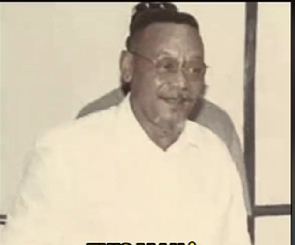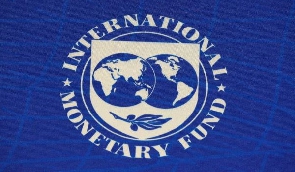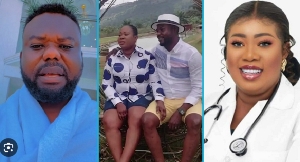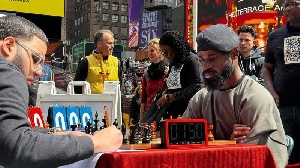Opinions of Sunday, 20 September 2009
Columnist: Gyimah, A. P.
Mr. President and My Dear Ghanaians, Are Our Children Safe?
Thank you for your persistent prayers for our fatherland Ghana. I am doing pretty well in God’s name. Your prayers together with my own commonsense, has kept me here and safe. It has been more than four months ago that I expressed my discontent before you and many and sundry, concerning the persistent abuses, namely rape - of young girls in our country. I proposed how we could unite to alleviate our Ghanaian kids, especially young girls from tyranny. Since then, I have not relented. I have been inexorably working hard to determine if we can meet the theme I introduced: “Raping Children and Teenage Girls: Mr. President and Fellow Ghanaians, What Should We Do To Stop It?”
“What Should We Do To Stop It?” This was not meant to be a rhetorical question, but a literal one. I led the discussion and came up with what I thought were some solutions based on my experiences in the developed world. Several follow-ups were made by me to officers’ in-charge of the case that I had made particular reference to in my whimper. The case involved the abuse of two sisters, ages 13 and 14, by police while being in police custody at Vakpo Police Station in the Volta Region. In order to determine if the tone of the applicable language in my discussion would work, the team working to help solve issues of children and youth; interestingly, feel that the outcome would be positive. Mr. President, thank you for the willingness of your workers and officers to work with us. The officers, who I am in contact with are not just cordial but open to us working with them as a team. They are assiduously working on the case with fervent interest in general on the issues of children and youth. With the help of the Ghanaian mass media, contacts that I made via telephone calls, and personal acquaintances, I found sufficient indications that officers, government officials, benevolent organizations, and even traditional communities are in the forefront of fighting injustices against children and youth. I am very proud of each of them for their conscientious efforts. However, the disappointments remain and are registered, as well, and need to be drawn to your attention, not only now but in my subsequent writings.
As a result of the follow-ups that I have made, please note my point of correction. Contrary to my earlier report, the two men who raped the two sisters were not policemen. The question remains as to how the rapists had access to the girls in the cell while Officer Samson Asare was on duty? The room in which the sisters were raped had police uniforms hanging on the wall. This was according to the report that the girls made to the parents and delivered to the public by mass media. The girls reported crying noticeably for Officer Samson Asare to rescue them while they were being raped. Officer Samson Asare and one of the rapists were arrested, and are now out on bail roaming about in town. The remaining rapist was at large (four months ago and I don’t know if he is apprehended). The foregoing justifies my question: “Mr. President and My Dear Ghanaians, Are Our Children Safe?” If civilians can walk into a police station, open police cells, escort alleged suspects in detention pending trials to police quarters to rape them and then return these suspects to the cells, lock the cells and leave the keys to the cells intact, while an officer is on duty then I must profess to you, Mr. President, and my dear Ghanaians, that our children are not safe, and our nation’s security is at stake. I know and trust, Mr. President, that you are a Godly person because you came to the presidency with a Bible in your hands. I and my dear Ghanaians pledge to you to use that Bible, your good heart, and your good conscience to do something for the safety of all Ghanaian children, youth, and women. We are ready to support you in the endeavor. Please note that the two sisters, who have our prayers and sympathies, have not even been offered any medical care or counseling since their rape. Over pain and suffering, particularly peer intimidation, they have not attended school after the rape occurred in the mid February or soon thereafter. In addition to the loss of their innocence, the instructional time and extracurricular activities lost by these girls is tragic. Furthermore, these girls are being tried in an adult court. It is unknown to me what kind of cells, juvenile or adult cells these kids were detained in. What is known is that the police detained the girls for three days. This is contrary to international and democratic procedures for detaining juveniles in police custody. Juveniles are not to be detained in police custody for more than six hours. They are required to be handed over to probation (juvenile) department before or at the end of the six-hour time for detention in a juvenile facility. A deviation from this procedure constitutes a breach of juvenile rights/liberty and international law. As you are truly aware, Mr. President, Ghana has a probation department. Any further interrogation, if felt necessary by the police officer, must be through the Probation Department so that arrangements can be made to get the girls interrogated and returned to the Probation Officers (POs) promptly. In the absence of a Probation Department, the parents or guardians of the kids would have become their custodians through an arrangement with the police before the kids were to appear before a juvenile court of law. Unless the kids’ offense is a violent crime, such as murder or gun related violence, the authorities must have a reasonable place to detain them, but not for more than 48 hours because they have to appear before a juvenile court within the 48 hour time frame.
For example, in the State of California and in many other states in the United States, if a juvenile suspect is detained and not brought before a court of law by the 48th hour of his/her detention at a juvenile facility, then the charges are automatically dismissed. Juvenile detention rules are different from those of adult detention and Governments do not deal leniently with peace officers in violation of juvenile detention rules. The officer processing for the detention of a juvenile is responsible for the consequences of any violation(s) of the rights of the juvenile detained. A juvenile in police detention facility must be visited by a police officer every 20 to 30 minutes before the six hour time limit is due. The police must provide the juvenile with food every two hours – 3 meals maximum for the entire six hours. If a detained juvenile refuses his/her meals, it is the duty and responsibility of the peace officer (i.e., police, probation, corrections, etc.) to keep the meal at an appropriate temperature in a refrigerator until the juvenile decides to enjoy his food. If a peace officer is found to be in violation, he/she is charged for the violation and placed in custody pending a trial in a court of law. To void such kind of unfortunate circumstances, peace officers are usually always responsive to the demands of the Government and communities. In the United States, the federal government being responsible for the implementation of international agreements and laws enforces the states to carry out this mandate. It uses federal funding and the federal court system to enforce the states to comply. The peace officers academies train cadets to understand this responsibility as binding on them at graduation and swearing in as officers of peace.
United Nations Rules for the Protection of Juveniles Deprived of their Liberty Adopted by General Assembly resolution 45/113 of 14 December 1990 must be carefully, clearly and closely studied and practiced by all Ghanaian stakeholders of children and youth affairs/safety. The United States of America, in spite of her downfalls in several areas in human rights management, is almost in full compliance with the “Beijing Rule”, to the best of my knowledge, observation, experience, understanding, and as a member of practitioners of children’s rights. And I hope that Ghana adopts the Beijing Rule in practice to benefit the adolescents living within her boundaries because Ghana lives in the “Beijing Rule” environment. Ghana signed the Beijing rule agreement in 1985/or 1990. In accordance with the laws, the two juvenile sisters discussed here clearly are not capable of standing trial at this time. They lack appropriate care and needed for a chance of recovery from their pain and suffering. Any trials conducted of the girls at this time by the Court would constitute a further violation of the rights of these kids. The children must be completely recovered from their abuses, pain and suffering, and have received adequate counseling before they can be tried in a juvenile court/facility if the case is not dismissed. If they have been tried, then, the prosecuting body, the Government and People of Ghana are deliberately abusing these children and their rights and need to dismiss their case for the over detention that they suffered. Also, as of now, the Police Chaplain has not visited the family to perform his duties including – praying for and counseling the family. Police chaplains are not hired to provide their services solely to the police and their family members. Their services extend to benefit victims, suspects, criminals, and the general public.
It surprises me to learn that the rape of little girls, young girls and boys, is a ‘plague’, and not a sporadic affair in our fatherland. I say ‘our fatherland’ because the system of inheritance that our forefathers left for us across the nation is such that the men are the legatees. The land is also owned by the men, even though it may be the property of all members of the family. The man is the head of the family and therefore the lead landholder. That is to say that Akans inherit the uncle’s (mother’s brother) property, and non-Akans inherit the father’s property. We do not have any other inheritance systems besides these. Our forefathers hoped that this way we, the men, would be able to manage the resources they left behind, human and material well enough to keep their heritage strong and on-going. Thus our cultural preservation depends on and is in the hands of us, the men. So by raping little girls, teenage girls, women, and boys in our fatherland are we, as men, keeping the aspirations and convictions our forefathers had for us? In other words, are we meeting our forefathers’ expectations? Are we managing the human and material resources they hoped, we the beneficiaries, would preserve? Do we deserve to inherit our forefathers’ property? Can the world be proud of us for this system of inheritance? Would not the world have doubts about our ways of life? Or are we tasking ourselves to prepare another ground for the unknown, “which may even add further salt to our injuries” to forcefully occupy our cherished fatherland again against our wishes? This is to mention and lament on history and contemporary affairs. Our historical experience is that the ‘unknown’ forcefully ruled and denied us “accountability, probity, and transparency” before we agitated for our independence in 1957 and/or thereafter. To sum up, we do not deserve to call Ghana our ‘motherland. We cannot rape our girls who are growing up to become mothers and then turn around to call our land ‘motherland’ in recognition of women in Ghana. Doing so would be horrendous, immature, immoral, and discourteous. Rape has gone on for a generation or more in our fatherland and it must stop now.
Our mothers and sisters have suffered for too long. We need to change our mothers’ lives. We need a change in our fatherland. We, as men, are the true caretakers/owners of Ghana and as per our forefathers we must be able to manage our land ourselves. Our mothers need an evolution, not a revolution. We need achievements for our mothers and not to make them perpetual failures and live in abject poverty, fear, and sorrow. Mr. President, as a lead person of our land, may I remind you that our mothers, consisting of all the female genders in our blessed nation Ghana, (i.e. locales, foreigners and visitors, including those married to foreigners) are at your mercy in all spheres of endeavors. First, is it not sad to hear from adult women’s voice on the radio complaining to the media (ADOM 106.3 FM RADIO STATION) about how they have been beaten and their monies obtained under duress from them by the police and the military just for hawking on the streets of Accra? One of the molested women related to the press that the police and the military used canes on the women. It is very sad to hear that women have treacherously been beaten again by the police and the military at this hour in our nation’s history. I doubt Dr. Alfred Vanderpuije’s true heritage, especially given his background in academia, because a true Ghanaian man with good education and training will never harass Ghanaian women. Mr. President, while you were away in Lybia, Dr. Alfred Vanderpuije ordered the police and the military to harass our mothers in Accra. Mr. President, I am afraid to request that you fire Dr. Alfred Vanderpuije for inefficiency, disgrace to our mothers, disrespect for the law, gross malpractices, and for creating a bad name for the Ghanaian democratic dispensation at both the local and international levels. What mandate does Dr. Alfred Vanderpuije have to instruct soldiers /to go to the Accra streets to forcefully, or peacefully, drive hawkers from the streets? The task of sending soldiers to town to perform any task is the sole mandate of the President of Ghana, or an Acting President of Ghana. Dr. Alfred Vanderpuije has never had such a Constitutional post, authority, or mandate since January the 7th of the year two thousand and nine. Furthermore, having stayed and worked in the United States of America for years, Dr. Alfred Vanderpuije has disgraced the United States of America by his practices which are contrary to democracy in Ghana. He lacks project design/development, planning, and management. His style of driving hawkers away from the Accra streets and demolishing houses in Accra are all examples of this. The Kumasi Metropolitan Assembly’s chief finds himself in a similar situation. Mr. President, please, I request you fire the Kumasi Metropolis’ chief as well. Mr. President and my dear Ghanaians, you will hear from me no sooner than later. Thank you for your attention, sirs.
Mr. A. P. Gyimah, education expert, based in The State of California, U.S.A. Interest areas: education administration – secondary and post secondary; comparative education – Ghana and the U.S.; Human Rights education, public safety education, and adult education. This writer does not take issues of children for granted, at all. Contact address: kwaku_poku@yahoo.com.












